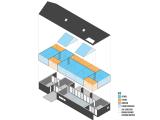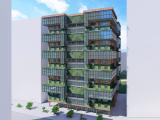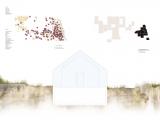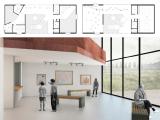DSGN 410 / Fall 2020
PROJECT DESCRIPTION:
The dream home is an expose of systematic exploitations within american suburban societies and their perpetrators. We looked at this topic through acts of surveilling, defending, and condemning. We felt that as a society we are in a state of justified paranoia, within the everyday (police, gossip, environmental concerns/climate change, politics, addiction to technology etc.) All of this comes down to a fear of the unknown and how we as a society try to cope with this through our own forms of control, within our homes. We are stating that architects are condemned within suburbia. The ‘American Standard’ is unfit for those housed on the outskirts of american cities, and those abandoned in the innermost regions. The invisible disease that consumes America goes unattended, while the desire to design defensive mechanisms has taken hold.
There is a disconnect that goes beyond the job description of the architect.The use of design to simulate control to those that constitute the privilege of negligence is prohibited. Violation of this notice is unlawful and will lead to the continued engagement of systematic destruction within society through the home itself. Note: this dwelling (exhibition) will examine the continuous cycle throughout our country’s development, specifically the American home. It will exhibit the way technology has taken over our sense of ideals to formulate a facade of total control that engulfs the invisible affairs within our built environments. It is no longer the architect’s job to solely design for the wants of the human, but to expose what has been lacking in design and give way to the breaking of these suffocating barriers.
STUDIO DESCRIPTION:
POST- STUDIO is a multidisciplinary collaborative studio between architecture and landscape architecture students exploring the relationship between land, justice, climate change, and policy. Post-Carbon, Post-Oil, Post-Spatial Disparity, Post-Anthropocene, Post- <insertproblematique>. The notion of "Post-" implies a future state. In this studio, students are asked to speculate on the future of ongoing current issues that are impacting our communities. One of the most significant national conversations surrounding these concerns is the Green New Deal (GND), which considers the state as an activist force to consider issues of global warming, economic inequalities, and systemic racism/sexism.
The GND is a reference to the New Deal (1933-1939), which was a “series of programs, public work projects, financial reforms, and regulations enacted by President Franklin D. Roosevelt in the United States responding to needs for relief, reform, and recovery from the Great Depression.” POST- Studio is a participant in the Landscape Architecture Foundation (LAF) sponsored Green New Deal Superstudio, where academic design studios across the country explored critical themes outlined by the recent Green New Deal climate proposal.
Within this framework, the studio asks, what does it mean to be a design activist? And what is the relationship of architecture and land, and how do we, as stewards of the environment, critically respond to ongoing and contentious political discourse? Geographically, this studio focuses on historically redlined areas of Omaha. Through research and designing, students sought to explore the implications of a variety of salient issues considered as part of the Green New Deal, including lead contamination, food access, job training, and community resilience.
Follow the College of Architecture






